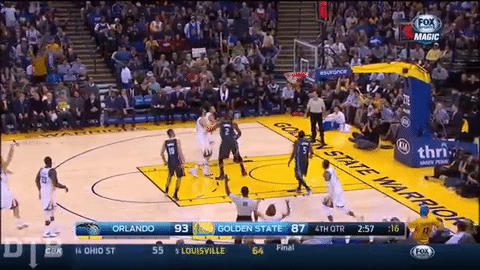After a long summer of topless championship parades, free-agency meetings in the Hamptons, Snapchat mishaps, and gold medals, the NBA is finally, truly, really, almost back. The start of training camp marks the beginning of our NBA Preview.
We kick things off with Warriors Week, an in-depth look at one of the most interesting assemblages of basketball talent ever. We’ll have a different theme each week, as well as the usual league coverage. So check back often. Basketball never sleeps, and neither do we.

It’s strange to think that the fulcrum of the Warriors’ season might just be Klay Thompson, the player early prognostications appear to paint as the symbol of the team’s collective sacrifice. With preseason watercooler discussion revolving around the question of whether there’s enough ball to go around, it’s funny that the pity has descended upon Thompson, who never had that much of the ball to begin with. “I feel kind of disrespected that people keep using the term ‘sacrifice’ to describe me and describe us,” Thompson told The Vertical weeks after Kevin Durant’s signing. “We all want to see each other do well. But I’m not sacrificing (expletive), because my game isn’t changing. I’m still going to try to get buckets, hit shots, come off screens.”
Thompson’s game is no movie, it’s more of a snap revealed in the two-second span between catch and release — the time it takes to focus a camera and click.
That’s about as long as the ball stays on Thompson’s hands on any given possession, whether he’s shooting or not. But he’s usually shooting it. Of Thompson’s 1,386 field goal attempts last season, 1,009 were taken within two seconds of touching the ball, by far the most in the NBA within that time frame. The gulf between Thompson and Al Horford, who came in second, is 183 field goal attempts, a disparity larger than the figure between Horford and Nikola Vucevic, who ranked 19th. Thompson’s time with the ball is relatively brief — he averaged 47.4 touches per game, compared to Steph Curry’s 85.9 and Draymond Green’s 81.2 — but he makes the most out of it. Among players who played at least half of last season, Thompson logged the third-most points per touch (0.468 points) in the league behind Shabazz Muhammad and J.J. Redick.
Thompson has taken a liking to explaining his shooting motion as a “reverse waterfall,” in interviews with the media; it’s imagery instilled by former Washington State coach Tony Bennett as he was honing his craft in college (personally, I think “geyser” is a much easier word to visualize, but who am I to get in the way of a good anecdote?). Even the best shooters in the world gush over Thompson’s shooting motion. “His ability to get his shot off, no matter where he catches the ball — down, up high, whatever — it’s right into that shot pocket,” J.J. Redick told ESPN’s J.A. Adande in 2015. It’s how quickly he gets the ball into his pocket — during the initial stage of a jump shot, with the shooting arm creating a 90-degree angle at the joint — that turns Thompson’s one dimension on offense into its own kind of Swiss army knife.
A lot of good shooters (like James Harden, for instance) like to dip the ball below their waist and fluidly enter their shot pocket to establish rhythm before the shot is released. What makes Thompson unique is that he can seemingly alter his shot pocket at will, depending on the situation. On a wide-open attempt, he’ll allow the ball to dip a bit, leading to a more relaxed shot; on a play in which he needs to get an attempt up quickly over an unsuspecting defender, the ball might not dip much at all, and instead, go straight into the pocket, preparing for launch. “From the shoulders up, it’s textbook,” coach Steve Kerr told Adande. It’s what makes Klay as interesting a shooter as Steph. With all of his rhythmic dribbles, Curry is always proactive in trying to overwhelm the defender. Klay is almost more defensive in his offense, like a counterpuncher. He takes what both what the offense and the defense gives him, and can adjust to change as it’s happening.
Where Curry’s fluid, full-body motion blurs the lines between setup and release, Thompson’s arm-intensive form actually disrupts his defender’s natural rhythmic anticipation with his ability to fire quickly, no matter where he catches the ball.

The Warriors players, including Klay, have sung Durant’s praises and it sounds like the team will make a seamless transition with its new star come late October. But when the kinks invariably begin to arise, it’ll be nice to have a safety net like Thompson, whose role with the team hasn’t changed much at all since he became a full-time starter four years ago, and won’t be changing this season, either.

It’s been almost three months since Durant made his decision to join the Warriors. I’ve thought a lot about this team, and I’m sure you have, too. Maybe you’ve exhausted your enthusiasm, and whatever’s left in the chamber has fermented into blank contempt. I’m not quite there yet. The question of what it means to sacrifice on a team that has so many overlapping, yet interconnected pieces is interesting to ponder, even if the answer is something obvious, like, “it doesn’t matter; wins trump all else.” When asked to clarify his comments during the offseason about not sacrificing for the team, Thompson said, “When you acquire the talent we did this offseason, I don’t think that’s a sacrifice at all. I think that we are in an amazing position to do things that haven’t been done here.”
That last part takes on quixotic undertones when you remember that the Kerr-era Warriors have already won a championship, and set historic precedents left and right, creating a new benchmark for a 20-year-old record previously thought to be untouchable. There isn’t much left to do on a basketball court that the Warriors haven’t already done. It’s enough to want to crowdsource challenges from the media, and it wouldn’t surprise me if one of the team’s main goals during the season is to put the talk of sacrifice to bed — to achieve a team-wide ego death.
Teams have strived to reach a utopian ideal in the past, banking on depth and chemistry to overcome deficiencies in apparent stardom — the 2004 champion Pistons, the 57-win 2013 Nuggets, and the 60-win 2015 Hawks come to mind. Of course, what the Warriors are hoping to accomplish with this team is, in a way, a more radical inverse: Golden State hopes to diffuse the singular talents of Curry, Durant, and Green, three of the most charismatic basketball players in the world, to the point where individual accomplishment is irrelevant. This is a superteam that rewires its own etymology: riches in superstardom, in itself, is not the team’s identity; how seamlessly that superstardom is subsumed within the team’s preexisting framework is. Perhaps the Warriors, who have been at the vanguard of this new age in positional fluidity, have moved on to consider the game’s meta-positions. For starters, what does it mean to be the alpha on this team? We create the hierarchy of first, second, and third options in sports as an organizing principle; it helps establish an order in what we perceive and how we choose to perceive those things. But on a team with three of the best shooters of all time sharing the floor, it seems a bit pointless.
“There’s plenty to go around,” Thompson said on The Damon Bruce Show on Monday. “There’s going to be different nights when guys excel, and there’s going to be nights when guys gotta take — not a backseat, but, you don’t see the numbers that other guys will. That’s fine.” The Warriors have been analytics darlings for years now, but we might be living in the universe in which they singlehandedly prove the hot-hand theory. The ball will be going to the open man this season in Oakland, and it’s fair to roll your eyes at the thought of that being a revolutionary act. But try to imagine watching this team without an expected quota; imagine seeing single digits in the points column next to the name Durant, Curry, or Thompson and not thinking anything of it. Imagine not wondering why Curry or Durant don’t have the ball in their hands. But that’ll be the reality, and it sounds like the team has already accepted it.
Surveying everything that’s come out of Golden State’s media day carnival, it seemed like Thompson was truly content with the attention being diverted elsewhere; he seemed loose, and unburdened. He seemed happy to talk to local radio about his time in Rio, about how he binged 20 hours worth of Power (“It shocked me. I didn’t know it was going to be that good.”), and about his dog Rocco taking a “ballsy and legendary” shit right on the diamond at Dodger Stadium.
It was a little different four months ago. Thompson wasn’t just the hero of the team’s best game of the season, he was the most valuable player of their postseason, full stop. In Game 6 of the Western Conference finals, with the Warriors trying to force a Game 7 after falling behind 3–1 in the series, Thompson scored 41 points and drilled an NBA playoff-record 11 3-pointers. It was the most stunning performance of his career.
After forcing the Game 7, Klay rode a cart to his postgame presser, sitting next to USA Today’s Sam Amick. “This wasn’t going to be my last game, man,” Thompson said, to himself, presumably, more than anyone else. In that moment, he was the Warriors’ best player, without dispute. Amick, who sat next to Thompson in the afterglow of the finest moment of his career, told Sports Illustrated’s Lee Jenkins, “I’d never heard him with that alpha attitude before.”
So what will it mean to be an alpha in Golden State this season? What will it mean to be a first option? It’ll mean dominating an instant, no more, no less. If all goes according to plan with the Warriors, the concepts we’ve let guide us through the sport might become as transient as the positional designations we’ve placed on Draymond over the years. We see Klay in moments, and if his Game 6 figures at all in your memory, maybe it won’t be too difficult to appreciate the team as a whole in the same way.
